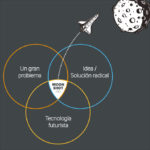Moonshots: Ideas that will change the world
Apollo 11 was a milestone for solving complex problems. Hence the name moonshots: projects that propose radical ideas for tackling major problems by using futuristic technology. Their capacity for innovation has just started.

There are many ways to arrive at that moment when what seemed impossible is no longer so. This is how it is described by Astro Teller, known as the Moonshot Captain. This scientist examines and accepts the most innovative and extravagant proposals that arrive at his office at Google X. The probability of something working is remote, but if it's successful it will change people's lives. This is how this kind of startups and projects come about, which can entail millions of euros in investment and become a success that will change our life as we know it, while others fail along the way. Although this doesn't seem to be a problem, as Teller says in his chat “The unexpected advantage of celebrating failure” in TED2016.
Solar, wind and water power still have a long way to go to replace traditional energy (today, 101 billion dollars are invested in renewable energy, while 550 billion dollars go straight to investment in fossil energy). But there are many startups working to change this situation. A good example is Tesla, whose idea is for homes not to have to rely on the power grid for lighting, thanks to its Powerwall batteries system, which collects the energy generated by solar panels. Another example scheduled for 2017 is the brainchild of the startup BioMason. It's purpose? To create biological construction materials using natural microorganisms and complex chemical processes. Its aim is to design small villages and towns that are part of the environment and integrate without damaging it with noxious particles.

The moonshots ahead of us
Moonshots don't only deal with environmental innovations, we also find them in industries such as aeronautics with companies like Jeff Bezos' Blue Origin or Virgin Galactic, which seek to create a new tourist sector with trips to outer space. Other spatial concepts are the 3D printers for zero gravity created by the startup Made In Space in Silicon Valley, which has become part of NASA's R&D department.
Health also has its own field of research, and the idea is to shed light on processes such as cancer detection through a blood test. The design bears the stamp of Illumina, which hopes to implement it by 2019. For now, the MIT is already collaborating in producing this technology.
Any sector can create moonshots, even the financial industry. Analysts and investors are demanding a radical change in traditional banking. One of its proposals is to sell AIG to Google to jointly create a fintech “laboratory”. Another proposal by the experts is the creation of a customized banking platform with a system of financial modules. Each module would enable customers to select and buy products offered by a bank and then combine them with the rest of modules from other banking institutions. Various offerings from different banks could be chosen online according to their needs.
Google, through its Google X department (integrated into the subsidiary Alphabet), accepts that there is a high percentage of failure in this kind of studies. Its most talked-about projects include Google Glass, Loon Project (hot-air balloons with wireless routers for providing Internet access to all the continents), Lift Labs (anti-tremor spoon for Parkinson patients) or more recently Google Car (driverless car).
Moonshots are the key to solving today's major problems. It will soon be fifty years since man landed on the Moon, and huge changes have taken place over these years. The next transformation is around the corner, awaiting the technological push that will be part of our future vision of the world.